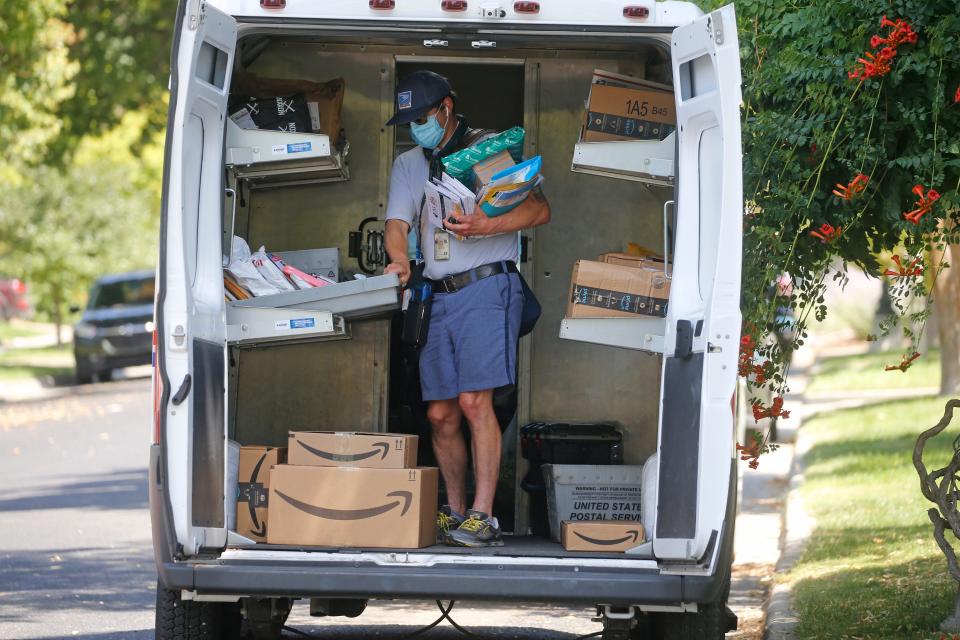Let the USPS ship alcohol. It will help post office finances and raise spirits nationwide.
For decades, winemakers have been legally allowed to ship bottles of wine directly to customers via private shipping companies. This has enabled vineyards from Napa to the Finger Lakes to sign up tourists for lucrative mail-order clubs and send bottles purchased on-site directly to the customer’s home. It has also generated revenue for the carriers without any notable problems. Despite this proof of concept, the struggling U.S. Postal Service is forbidden by Congress to accept alcohol shipments of any kind. But that may soon change.
Congress is giving alcohol shipping a fresh look in light of the USPS’ ongoing revenue struggles, as well as the growing popularity of shipping and delivery of everyday household goods. Democratic Rep. Jackie Speier of California, Republican Rep. Dan Newhouse of Washington and Democratic Sen. Jeff Merkley of Oregon have introduced the USPS Shipping Equity Act, which would allow the Postal Service to mail beverage alcohol products directly from licensed producers – including distilleries, breweries, wineries and cideries – to legal-drinking-age consumers in states that allow direct-to-consumer alcohol shipping.
Consumers want everything delivered
The measure is well-timed. Not only do 47 states allow shipments of wine, but 10 states plus Washington, D.C., also allow shipping of spirits – and this number is growing. Since the pandemic, six additional states have temporarily permitted distillers to ship to in-state consumers. Due to the overwhelmingly positive reaction from distillers and consumers, some of these states, such as Virginia and California, are now considering making direct-to-consumer shipping of spirits a permanent option.
Congress is right to view this, in part, as a golden opportunity to help the struggling USPS. Given the decline in letter delivery, the Postal Services' long-term viability will hinge on its ability to capture more of the demand for package delivery. The expansion of alcohol shipping is a rare opportunity to compete for an emerging portion of the package delivery market. But Congress must act quickly for the USPS to be able to take advantage, as the bill requires a two-year waiting period between passage and implementation.

The Distilled Spirits Council estimates that if the law is passed promptly, it would generate $180 million in annual revenue for the USPS, which would provide a much-needed boost to this essential federal agency and its more than 600,000 workers and employees. It’s no wonder that the majority of Postal Service unions and associations have offered enthusiastic endorsements of the legislation.
Consumers, of course, are also poised to benefit. The pandemic has dramatically changed the way we shop for everyday goods, including beverage alcohol, and the expectation that we can purchase what we need with a click and have it delivered to our door with proper identification will not soon go away.
Ring in the new: A century after Prohibition, will the coronavirus finally end it? We'll drink to that.
A recent consumer survey found that 84% of regular craft beer drinkers want to be able to legally purchase beer via direct-to-consumer shipping to their homes, and there is similarly robust support among spirits consumers. Those most eagerly eyeing the developments are the more than 20,000 craft beverage producers across America.
Through the COVID-19 pandemic, these small businesses have experienced dramatic declines in revenue, due in part to the immediate closure of tasting rooms and tours. The loss of on-premises sales caused an average revenue decline of 40% last year among small beverage alcohol producers.
Shipping alcohol is not a problem
The challenges are compounded for producers who operate in rural areas, or for smaller and newer craft producers who struggle to attract the attention of wholesalers. This is why direct-to-consumer shipping serves as an important complement to the traditional three-tier system of beverage alcohol distribution – in which the product goes from producers to distributors to retailers – and has been a critical business lifeline during the pandemic.
Tips from 500 years ago: Ancient advice for drinking at home during coronavirus self-quarantine
The wine industry has proved that shipping alcohol is, quite simply, not a problem. It can be shipped safely and responsibly to adult consumers, with already well-established (and newly tech-enhanced) safeguards to ensure minors cannot illegally access alcohol. Now, as the USPS continues to struggle, Congress has an opportunity to change the game by finally allowing it to ship beverage alcohol of all kinds. This would create a win-win-win for postal workers, consumers and the entire craft spirits industry, from grain farmers to distillers to manufacturers, giving millions of Americans cause to raise a glass.
Chris Swonger is the president & CEO of the Distilled Spirits Council of the United States (DISCUS) and Responsibility.org. Follow him on Twitter: @ChrisRSwonger
You can read diverse opinions from our Board of Contributors and other writers on the Opinion front page, on Twitter @usatodayopinion and in our daily Opinion newsletter. To respond to a column, submit a comment to letters@usatoday.com.
This article originally appeared on USA TODAY: Beer, wine and liquor: Let USPS ship alcohol direct to consumers

